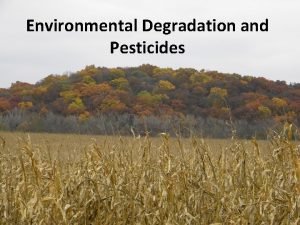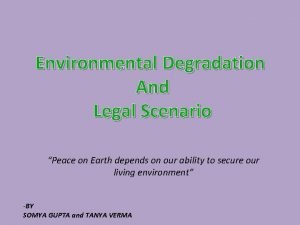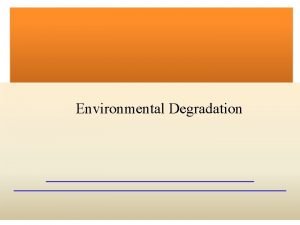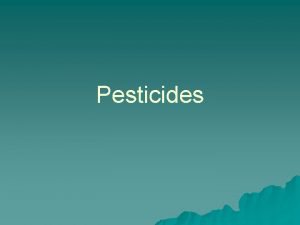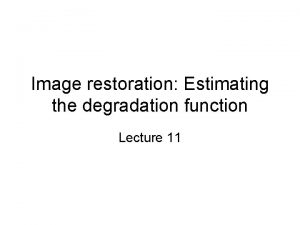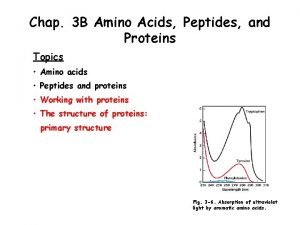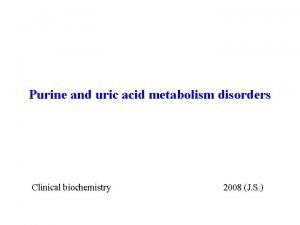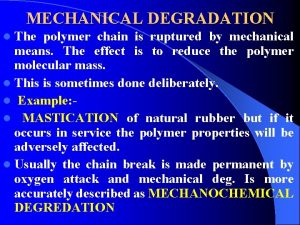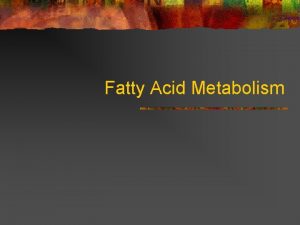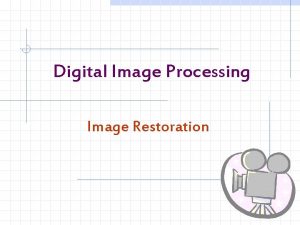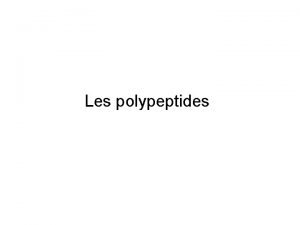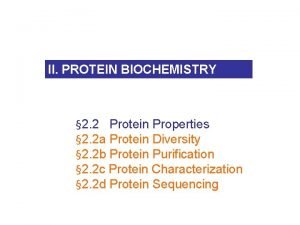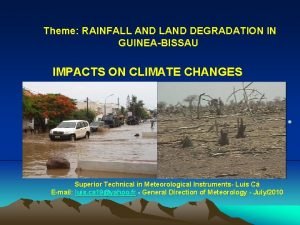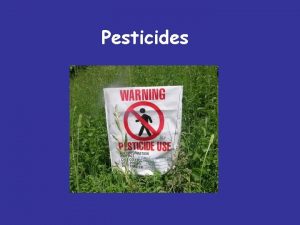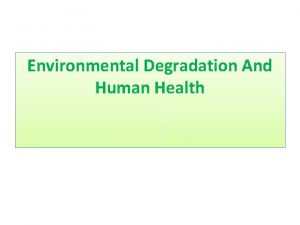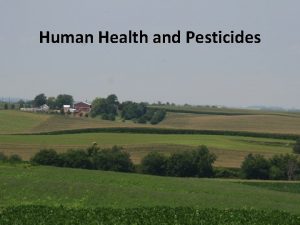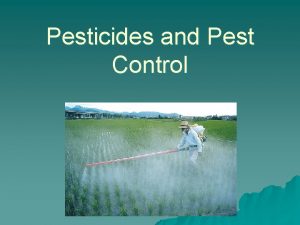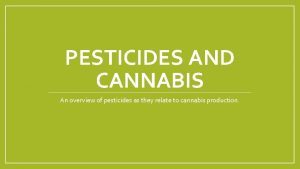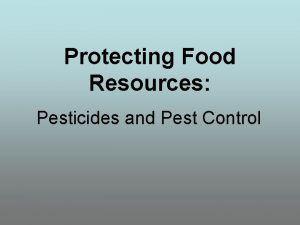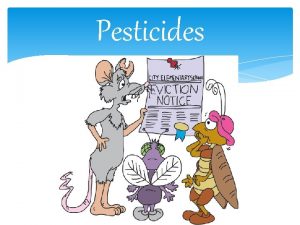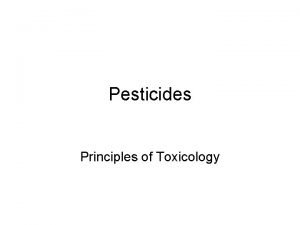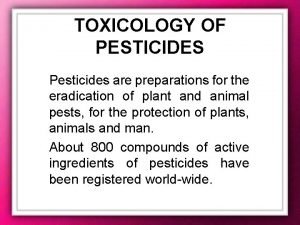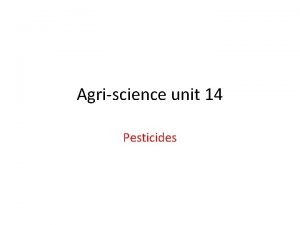Environmental Degradation and Pesticides Outline Importance of our













- Slides: 13

Environmental Degradation and Pesticides

Outline • • • Importance of our environment What is environmental degradation? Water Air Harm or loss of beneficial insects Conclusions

Importance of our environment • This is were we live, work, and play • Provides resources for – – Food and fuel production Water supplies Recreational activities Other creatures live here • Iowa has laws in place to protect the environment from careless and damaging activities • We should seek to protect the place we live regardless of whether or not it is the law

Environmental benefits of pesticides • Preserve habitat by increasing crop production on farm land • Manage erosion by enabling no-till • Manage invasive pest organisms Data from: Whitford, F. , Pike, D. , Hanger, G. , Burroughs, F. , Johnson, B. , and Blessing, A. The Benefits of Pesticides A Story Worth Telling. Purdue Extension. PPP-70. Purdue University.

What is environmental degradation? • Degradation occurs when a part of the environment in which we live is damaged or polluted in some way. • Pesticides can contaminate water sources, the air we breathe, and harm animals such as bees that are beneficial to human beings. • Contamination can make resources less usable or even dangerous to use.

Water • People depend on water for drinking, growing food, transportation, recreation, etc. • Ground water and surface water can both be contaminated by pesticides Data from: Iowa Water Pollution. Iowa Environmental Issues Series. Iowa Association of Naturalists. IAN-103. 1998.

Ground Water • Pollution occurs from – Pesticides leaching through soil – Old wells – Agricultural drainage wells • Explore other options of pest management before using pesticides Data from: Iowa Water Pollution. Iowa Environmental Issues Series. Iowa Association of Naturalists. IAN-103. 1998.

Surface Water • Polluted by – Drift and nearby pesticide sprays – Rain washing pesticides into waterways • Contamination prevented by limiting pesticide use and following label directions Data from: Iowa Water Pollution. Iowa Environmental Issues Series. Iowa Association of Naturalists. IAN-103. 1998.

Air • Pesticide drift occurs when pesticides are windblown from the target area. • Particle and vapor are two kinds of pesticide drift. • Volatile organic compounds result from some pesticides that can react with other compounds and form ozone. Data from: Wixted, D. , Boerboom, C. , Alexander, M. , and Pringnitz, B. Managing Pesticide Drift in Iowa: Field Sprayers. PAT 37. November 1999.

Particle and vapor drift • Particle drift occurs when a pesticide moves through the air as droplets during application. • Vapor drift occurs when applied pesticides volatize, or turn into fumes and move through the air. • Can harm other plants, injure people or animals, and pollute surface water • Follow label, apply during suitable weather, and use appropriate sprayer settings Data from: Wixted, D. , Boerboom, C. , Alexander, M. , and Pringnitz, B. Managing Pesticide Drift in Iowa: Field Sprayers. PAT 37. November 1999.

Beneficial insects • Beneficial insects are helpful insects! • They eat pest insects and can pollinate fruits and other plants (honey bees). • Beneficial insects can be harmed by insecticides and be killed along with the pests. © Marlin E. Rice

Honey bees • Honey bees pollinate many kinds of plants and produce honey. • Pesticides can harm bee colonies. • Approximately 1 million colonies per year in the U. S. are damaged or killed. • Iowa has a law that protects bees from harmful pesticides. © Marlin E. Rice Data from: Bohmont, Bert, L. The Standard Pesticide User’s Guide. Sixth Edition. Prentice Hall. 2003.

Conclusions • Pesticides are an important tool in modern agriculture. • Consider how pesticides could harm the environment before you apply them. • Follow the label for correct application methods. • Consider alternative management options. • Be safe and watch out for the safety of people, animals, and the place where you live.
 Importance of environmental degradation
Importance of environmental degradation Conclusion of environmental degradation
Conclusion of environmental degradation How environmental degradation occurs
How environmental degradation occurs Parthion
Parthion Estimation of degradation function
Estimation of degradation function Purification table
Purification table Final product of purine degradation
Final product of purine degradation Mechanical degradation
Mechanical degradation Metabolismn
Metabolismn Optimum notch filter in digital image processing
Optimum notch filter in digital image processing Light induced degradation
Light induced degradation Edman degradation
Edman degradation Purification yield calculation
Purification yield calculation Land degradation definition
Land degradation definition
